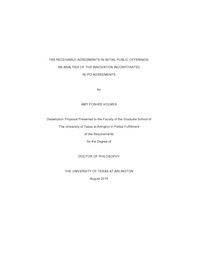
ATTENTION: The works hosted here are being migrated to a new repository that will consolidate resources, improve discoverability, and better show UTA's research impact on the global community. We will update authors as the migration progresses. Please see MavMatrix for more information.
Show simple item record
| dc.contributor.author | Holmes, Amy Foshee | |
| dc.date.accessioned | 2016-01-28T18:19:30Z | |
| dc.date.available | 2016-01-28T18:19:30Z | |
| dc.date.submitted | 2014 | |
| dc.identifier.other | DISS-12766 | |
| dc.identifier.uri | http://hdl.handle.net/10106/25568 | |
| dc.description.abstract | A Tax Receivable Agreement (TRA) is a binding commitment between a newly public firm and the firm's founders to include a tax-sharing arrangement, obligating the IPO firm to make annual cash payments to the pre-IPO owners. The opportunity for shared tax benefits arises when the pre-IPO owners sell equity and achieve a step-up in basis of assets for the IPO firm. The newly created tax assets and the prior existing tax assets can offset future taxable income at ordinary corporate tax rates. This tax-sharing arrangement will typically provide for payments of 85 percent of the tax savings. This type of "Supercharged IPO" provides monetary returns to the founders or the pre-IPO owners for years following the IPO transaction.
An analysis of this, relatively new, financial tool is a timely discussion for researchers, policymakers, investors, and entrepreneurs. With the recent focus on the IPO market, as evidenced by the Jobs ACT of 2012 and the current discussion of tax reform by the U.S. Congress, the inclusion of a tax receivable agreement in an initial public offering and the implications of this agreement for financial reporting warrant empirical analysis.
This study makes a contribution to the literature by identifying features and characteristics of IPO firms that include TRAs. I empirically test the difference between the offer prices and the first-day closing prices to evaluate the level of information asymmetry in IPO firms and the effect of TRAs on this asymmetry. In addition, I examine the market perception of various components of financial reporting linked to TRA firms in relation to stock prices. Using the first-day closing prices, stock prices at the end of the quarter of the initial offerings, end of year one and end of year two following the initial offerings, I evaluate the market perception of the value of the TRAs and the specific accounts that report the deferred tax assets and the obligations for payments to the pre-IPO owners. | |
| dc.description.sponsorship | Skantz, Terrance | |
| dc.language.iso | en | |
| dc.publisher | Accounting | |
| dc.title | Tax receivable agreements in initial public offerings: An analysis of the innovation incorporated in IPO agreements | |
| dc.type | Ph.D. | |
| dc.contributor.committeeChair | Efendi, Jap | |
| dc.degree.department | Accounting | |
| dc.degree.discipline | Accounting | |
| dc.degree.grantor | University of Texas at Arlington | |
| dc.degree.level | doctoral | |
| dc.degree.name | Ph.D. | |
Files in this item
- Name:
- out.pdf
- Size:
- 1.210Mb
- Format:
- PDF
This item appears in the following Collection(s)
Show simple item record


